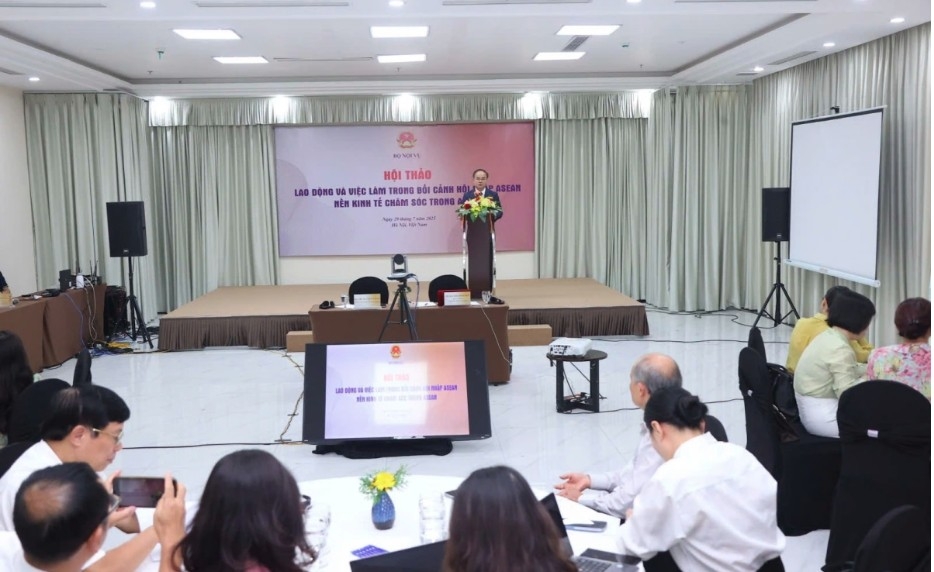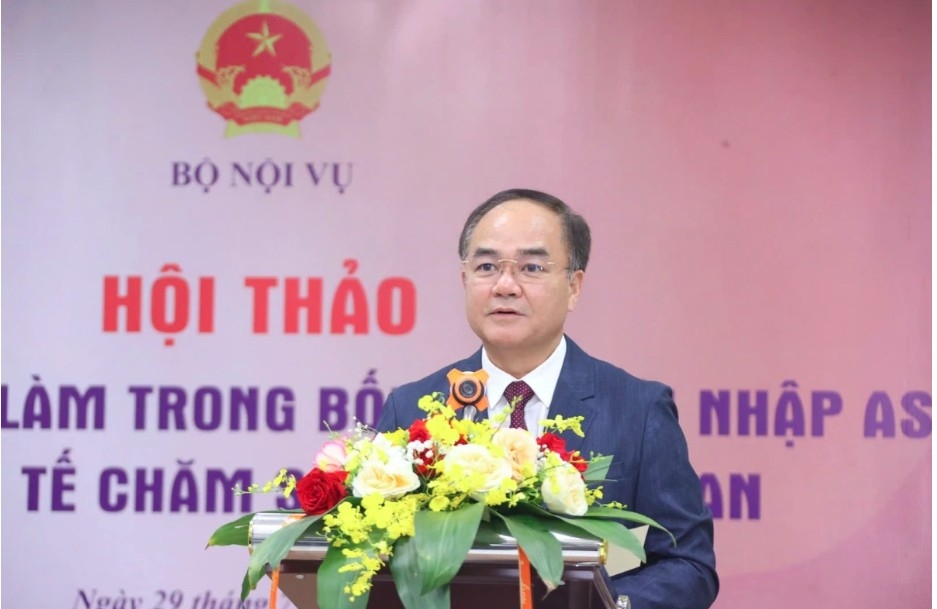Vietnam plays a leading role in promoting care economy in ASEAN
VOV.VN - Vietnam is stepping up efforts to promote a sustainable, inclusive care economy across ASEAN, reaffirming its commitment to labor cooperation and regional integration amid global uncertainties.

The Ministry of Home Affairs held a seminar titled The Care Economy in ASEAN on July 29 in Hanoi with a view to augmenting regional labor cooperation and marking the 30th anniversary of Vietnam’s accession to ASEAN (July 28, 1995 – July 28, 2025).
In his remarks, Deputy Minister of Home Affairs Vu Chien Thang said that Vietnam currently has around 53 million workers aged 15 and above, of whom nearly 24.7 million are women. Although the unemployment rate remains low (2.24%), the quality of the workforce remains a major challenge. Only about 28.3% of workers hold a diploma or certificate, much lower than in several ASEAN member states such as Singapore (50-60%), Malaysia (40-50%), and Thailand (30-45%).
According to Deputy Minister Vu Chien Thang, as Vietnam deepens its integration into the global economy, it faces increasingly intense competition in both regional and international labor markets. Stricter requirements for skills, foreign languages, and international labor certifications call for comprehensive efforts, from policy formulation to practical implementation.
“As a proactive and responsible member of ASEAN, Vietnam is pursuing a range of policies to improve workforce quality and integrate more effectively into the regional labor market,” he emphasized. “These include institutional reforms, enhancements in training and skills development, strengthened regional and international cooperation, promotion of mutual recognition arrangements, and the adoption of ASEAN’s eight-level National Qualifications Framework.”
The Deputy Minister also noted that Vietnam is actively carrying out regional labor commitments, with several initiatives receiving high praise. These include the development and implementation of the ASEAN Declaration on Human Resources Development in a Changing World, the issuance of gender mainstreaming guidelines for labor policies, and research on supporting returning migrant workers in reintegrating into the labor market.
Such efforts are contributing to a fundamental shift in human resource quality, supporting socio-economic development while enhancing the competitiveness of Vietnam’s workforce in both regional and global labor markets.
At the seminar, participants also discussed the rising trend of intra-ASEAN labor migration.

Deputy Minister of Home Affairs Vu Chien Thang stated that intra-regional labor migration is a defining feature of the ASEAN labor market. According to reports from the International Labour Organization (ILO) and the ASEAN Secretariat, this trend has been rising in recent years, with around 10 million migrant workers currently living and working across ASEAN member states.
Migrant workers not only play a vital role in the care economy of ASEAN member states but also fill jobs that local labor either cannot meet or is unwilling to take on. They help ease the burden on national care systems while bringing in new skills and experience.
“However, this workforce still faces numerous challenges, from inadequate working conditions to limited access to basic rights and entitlements. It is therefore essential to adopt appropriate policies to safeguard migrant workers' rights and ensure a safe, equitable working environment,” Deputy Minister Vu Chien Thang emphasized.
Ensuring employment for ASEAN citizens
Speaking at the seminar, Ha Thi Minh Duc, Deputy Director General of the Department of International Cooperation, affirmed the importance of the ASEAN Labour Ministers Meeting (ALMM) as a key platform for member states to coordinate policy development and advance initiatives to improve working conditions and grow the care economy.
For the 2020–2025 period, ASEAN has pledged to prepare its workforce for the future of work through a series of key documents, including the ASEAN Consensus on the Protection and Promotion of the Rights of Migrant Workers (2017); the ASEAN Declaration on Promoting Green Jobs for Equity and Inclusive Growth (Malaysia, 2018); the ASEAN Declaration on the Future of Work: Embracing Technology for Inclusive and Sustainable Growth (Singapore, 2019); and the ASEAN Declaration on Human Resources Development for the Changing World of Work along with its accompanying Roadmap (Vietnam, 2020).
In Vietnam, cooperation efforts have focused on enhancing workforce productivity and competitiveness, promoting sustainable employment, strengthening social protection systems, and improving labor relations.
Key priority areas include: integrating gender equality into labor policies; promoting cross-sectoral cooperation on social protection; and assessing the harmonization of labor legislation across the region.
Ha Thi Minh Duc stated that in today’s unpredictable global landscape, shaped by strategic rivalry among major powers, armed conflicts, supply chain disruptions, and population aging in countries such as Japan, the Republic of Korea (RoK), Australia, Germany, and the Czech Republic, the demand for migrant labor is growing. In this context, ASEAN is drafting its Work Programme for 2026–2030, which aims to ensure inclusive employment, raise labor productivity, and build a workforce that is both competitive and resilient in adapting to new job requirements as a contribution to improving people’s living standards
The growing demand for care-related human resources, from eldercare and childcare to patient care, is placing increasing pressure on social protection systems and calls for a rational and sustainable allocation of resources. Notably, the bulk of caregiving responsibilities still falls on women, especially within families.
This reality highlights the need for a more comprehensive approach to the care economy – one that better leverages the labor force in this sector, where migrant workers continue to play a pivotal role.
Through the seminar, Vietnam once again affirmed its role as an active and responsible member of ASEAN, proactively contributing to the building of a cohesive, inclusive, and resilient ASEAN Community amid the constant shifts of regional and global labor markets.




